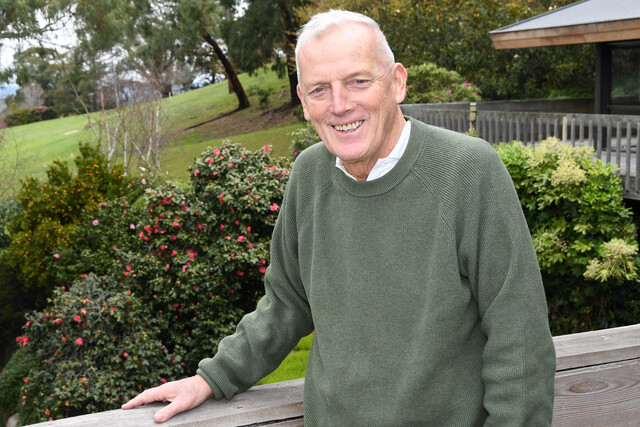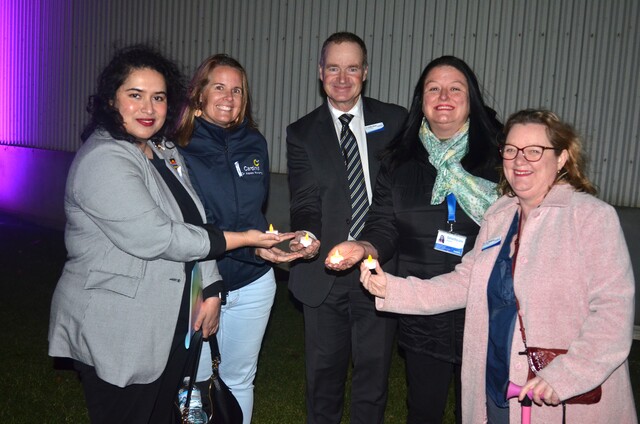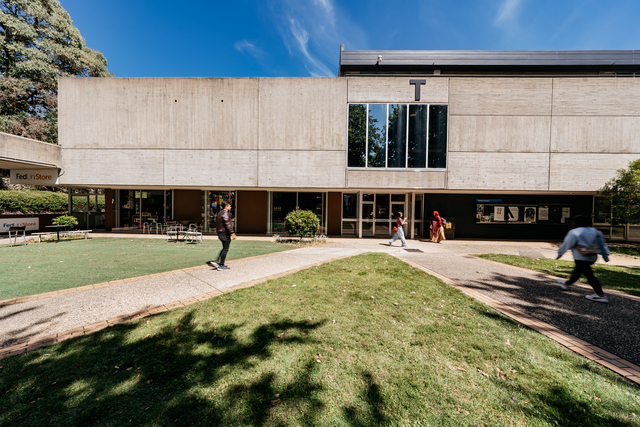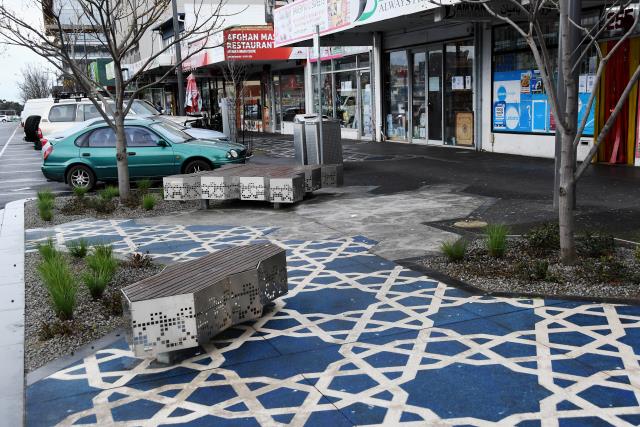Sandy Roberts had no idea what the future would hold when the Channel Seven broadcaster prophetically put the final exclamation mark on his brilliant call of Geelong superstar Gary Ablett’s 1989 VFL Goal of the Year.
“Here is the magician at work; he shoots towards goal…what more can you say.”
Almost 35 years later to the day, those magicians are researchers and hematologists; shooting towards a goal of finding out more about blood cancer Myeloma.
A largely unknown disease; awareness around Myeloma became more prominent, and the disease more targeted, after Roberts was diagnosed in May 2022; becoming the public face of the battle roughly a year later.
“What can I say, it’s very humbling, we’re just so thankful that we have the opportunity to make a difference,” Roberts said, humbled again after being awarded a 2024 Medal of the Order of Australia (OAM) – General Division – for service to media as a sports commentator.
But his true humility stems from the support he has received – from friends, family and former colleagues – who have rallied to the Myeloma Ambassador’s cause; raising much-needed funds, and awareness, to help ignite change.
The support is not surprising however, given the respect the 74-year-old Lysterfield local has generated in a lifetime in the broadcasting industry, after being raised in a rural setting in South Australia.
“Being awarded an OAM, I have had time to reflect; and it’s a far cry from being on a farm near a little town called Lucindale,” Roberts said.
“One of my main reflections is disappointment that my mum (Nan) has passed on, because when I was young and working out what I wanted to do, she gave me a book called Foreign Correspondent.
“It was about a journalist who covered wars and conflict, and I thought ‘yeah, I wouldn’t mind doing that’.
“I got a job at News Limited in Adelaide as a copy boy, but after a year and a half, Rupert (Murdoch) decided he didn’t want copy boys anymore, so I had to look elsewhere.
“I went to Perth and got a job in radio there, as a journalist, on 6PM, reading news there as well.
“Television had come along; I wanted a crack at that; so after a couple of years overseas I got a job at 3CS Colac.
“I was there for a year, just to gain experience, but I was really keen on television.
“I got a job at BCV8 Bendigo, and from there I went back to Adelaide; did an audition at Channel Seven as a general announcer and got the job.
“A general announcer did absolutely everything, you did the news, the weather, the midday movie, the sport; and I did that for a few years before someone asked if I was interested in doing football.
“I barracked for Norwood, loved the SANFL (South Australian National Football League), so said ‘yes’ and that’s how footy started for me.”
Roberts developed his craft and work ethic in Adelaide, following sage advice given by an experienced colleague.
“In Adelaide, the guy that I was influenced by was a man by the name of Bob Francis; he was in radio and television and did them both very well,” Roberts explained.
“I asked his advice one day; he told me ‘Whatever you’re asked to do, just do it, and you’ll find out at some stage that a particular path is right for you.’
“He was right, the more overall experience you can get in the television industry, then the better off you will be.”
The career of the affable Roberts took off at the age of 30.
“It was 1980, and Seven in Adelaide was like a cousin to Seven in Melbourne; affiliated, but not like they are now,” he said.
“I was asked to go to Moscow for the Olympic Games, for Seven, I jumped at it, and that was the start.
“Ron Casey, who was a marvelous man and General Manager of Seven in Melbourne, a great lover of sport, a former chairman of the North Melbourne footy club, he did everything.
“He got the rights, he went to all the senior meetings of the IOC, and he would front the prime-time coverage for Seven from Moscow.
“After a few days, Gary Fenton, the Executive Producer for Sport, noticed that Ron was looking tired, just from the stress of it all.
“He told Ron to concentrate on the executive stuff and not the on-air stuff, and Ron asked ‘well who are you going to get to do that.’
“Gary said, ‘well Sandy Roberts can do it’.
“A couple of days before the end of the Moscow Olympics, Gary and Ron got hold of me and asked if I’d like to move to Melbourne.
“It didn’t take me long to decide that one either.”
Taking over from Ron Casey in Moscow was a forerunner to his time in Melbourne, with Roberts taking the plum job of hosting Channel Seven’s Sunday sporting staple; World of Sport.
The kid from Lucindale was now sharing the screen with famous football faces such as Jack Dyer, Ted Whitten, Ron Barassi, Lou Richards and Bobby Skilton.
“I was like a kid in a lollie shop,” Roberts beamed.
“When I was asked to take over from Ron, he called me up to his office on the first day I was doing it, and he asked me before 10am in the morning, ‘what are you having to drink?
“I said, ‘no, I’m fine thanks Ron,’ but there were others sipping on a scotch, and that sort of summed up World of Sport.
“We had a running sheet, but after 10 minutes of being on air we were 15 minutes late (laughs).
“That’s how crazy it was.
“It was a long day, but a great day, being around those great people; you’re living off adrenaline.”
Versatility became a strength for Roberts who added tennis, motor-racing, horse-racing and many other sports to his skill set.
He also covered golf, at a time when a young Greg Norman was starting to emerge from the pack.
He was an absolute hero,” Roberts enthused.
“My first golf coverage for Channel Seven in Adelaide was in 1976, the West Lakes Classic, and there was this big blonde bombshell playing, and that was his first victory.
“From there, his career surged forward, I came over to Melbourne, Seven picked up the rights to golf, so obviously I worked with him a lot.
“On a personal note, he was also very good to me.
“I had a very sick son, Sam, and one night after practice, before the (Australian) Masters officially began at Huntingdale on Thursday, Greg and I flew down to my farm in the Western Districts and Sam was down there.
“Greg played a game of snooker with him, chatted to him, and was just marvelous with him, and Sam died several days later.
“Greg put Sam’s name on his hat and wore it during the Masters.”
Roberts retired from broadcasting in 2018; then battle through Covid like all others, before a fall down a flight of stairs at his Lysterfield home would change his and wife Carolyn’s lives forever.
“We live in a two-story house, and before the fall I had only a few weeks prior had open-heart surgery,” he explained.
“A couple of boys came to help move a couch, from downstairs to upstairs, and I stood behind them.
“The friend in front of me tripped, lost his footing, and fell back on me, and that pushed me down the stairs.
“I passed blood so went to the hospital and had scans, and then the doctor came out and told me what he had found.
“He said, ‘you’ve got broken ribs; also, do you know you’ve got cancer.
“I had no idea; lesions were discovered on my back, on my pelvis, my sacrum; we were shocked, but just had to come to grips with it.
“We had to get organised; find ourself a good hematologist; and find out about Myeloma.
“I knew nothing about it, nothing at all, the nearest thing I knew was Melanoma…but it’s nothing like it.”
Sandy and Carolyn worked through the initial shock, before deciding to make a difference.
“It certainly changed our life; and it probably took a year of talking about it, going through some rough patches, before my wife Carolyn and I looked at each other and asked ‘what can we do’.
“Let’s try and make people more aware; let’s publicise it and get it out there.
“It’s been extremely gratifying that so many people have come forward.
“We had our first Myeloma Long Lunch earlier this year, at the Glasshouse, in February, a wonderful sellout, 500 people, 200 on the waiting list, and it sold out in 15 days.
“BT (Brian Taylor) and Bruce (McAvaney) were involved, Jennifer Keyte hosted it, and so many people got behind it.
“People who had Myeloma came from Central Queensland and Perth; they were so happy that somebody was finally talking and telling people, what Myeloma is all about.
“It’s changed our lives; but we’re very keen to do it; and to continue doing it.
“It’s (money) not only for research, almost more importantly is having the opportunity of paying more staff, particularly in rural areas, for people that have Myeloma in the country.
“The lunch raised over $200,000, we had a separate donation of $220,000, and that’s to go to rural nurses.
“The research being done by the researches and hematologists will also benefit…it covers a fairly wide range.”
So, what is Sandy’s prognosis moving forward?
“It’s good,” he said.
“I was told I was in remission several months ago; and I just have a program that I stick by.
“I have regular blood tests and they’re looked at by the hematologist, and if there are adjustments that need to be made to what I’m taking, we make them and move on.
“He is happy at the moment; so, I am too.”







